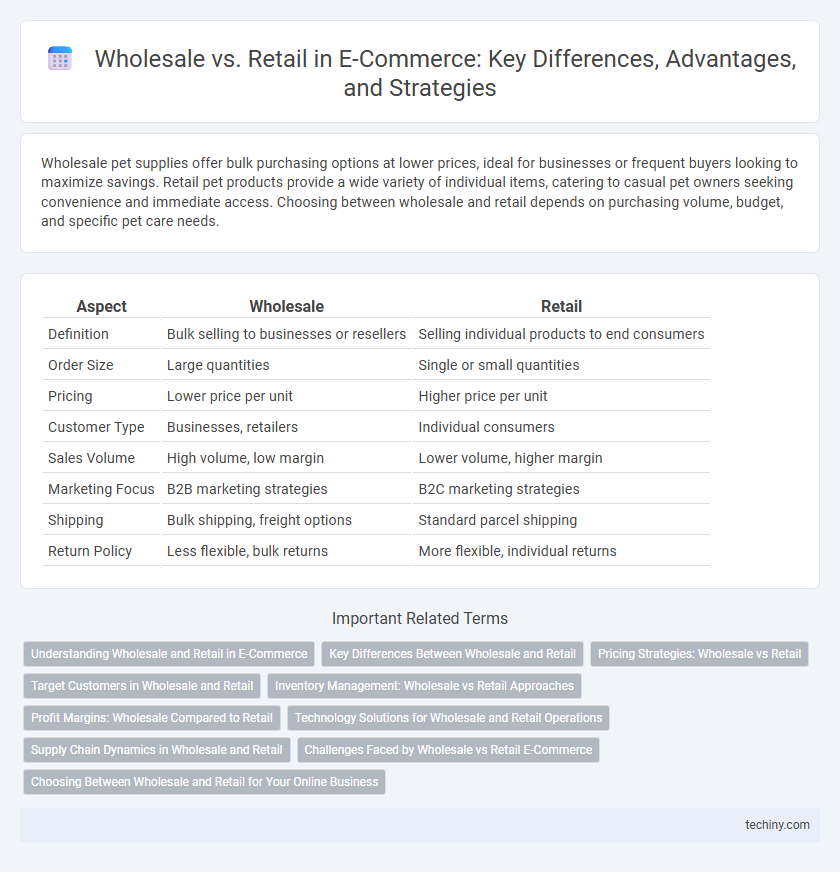Wholesale pet supplies offer bulk purchasing options at lower prices, ideal for businesses or frequent buyers looking to maximize savings. Retail pet products provide a wide variety of individual items, catering to casual pet owners seeking convenience and immediate access. Choosing between wholesale and retail depends on purchasing volume, budget, and specific pet care needs.
Table of Comparison
| Aspect | Wholesale | Retail |
|---|---|---|
| Definition | Bulk selling to businesses or resellers | Selling individual products to end consumers |
| Order Size | Large quantities | Single or small quantities |
| Pricing | Lower price per unit | Higher price per unit |
| Customer Type | Businesses, retailers | Individual consumers |
| Sales Volume | High volume, low margin | Lower volume, higher margin |
| Marketing Focus | B2B marketing strategies | B2C marketing strategies |
| Shipping | Bulk shipping, freight options | Standard parcel shipping |
| Return Policy | Less flexible, bulk returns | More flexible, individual returns |
Understanding Wholesale and Retail in E-Commerce
Wholesale in e-commerce involves selling large quantities of products directly to retailers or businesses at lower prices, enabling bulk purchasing advantages and streamlined supply chains. Retail focuses on selling products in smaller quantities directly to consumers through online platforms, emphasizing personalized shopping experiences and convenience. Understanding these distinctions helps businesses optimize inventory management, pricing strategies, and customer targeting in the e-commerce landscape.
Key Differences Between Wholesale and Retail
Wholesale involves selling large quantities of products at lower prices primarily to businesses, while retail targets individual consumers with smaller purchase volumes and higher prices. Wholesale transactions typically bypass traditional storefronts, using bulk orders and direct distribution channels to streamline supply chains. Retail focuses on customer experience, offering diverse product assortments and personalized services to meet consumer demand.
Pricing Strategies: Wholesale vs Retail
Wholesale pricing strategies typically involve offering products at significantly lower prices per unit compared to retail, enabling bulk buyers to benefit from cost savings and increased profit margins. Retail pricing is set higher to cover additional expenses such as marketing, customer service, and store operations, targeting individual consumers purchasing smaller quantities. Effective e-commerce businesses adjust wholesale and retail pricing dynamically based on market demand, inventory levels, and competitor pricing to maximize revenue.
Target Customers in Wholesale and Retail
Wholesale targets businesses such as retailers, manufacturers, and resellers looking to purchase large quantities at discounted prices for resale or production purposes. Retail focuses on individual consumers or end-users who buy products in smaller quantities for personal use. Understanding these distinct customer bases helps businesses tailor marketing strategies and inventory management effectively.
Inventory Management: Wholesale vs Retail Approaches
Wholesale inventory management focuses on bulk stock handling and efficient warehousing systems to accommodate large quantities, minimizing storage costs and optimizing order fulfillment speed. Retail inventory management emphasizes maintaining diverse product assortments with real-time tracking to meet immediate consumer demand and reduce stockouts. Both approaches rely on technology-driven solutions, but wholesale systems prioritize volume control while retail systems optimize product variety and turnover rate.
Profit Margins: Wholesale Compared to Retail
Wholesale profit margins are generally lower than retail margins due to bulk pricing and reduced per-unit costs. Retail businesses benefit from higher markups by selling individual products at prices that reflect consumer demand and convenience. Understanding these margin differences is crucial for pricing strategies and maximizing overall profitability in e-commerce operations.
Technology Solutions for Wholesale and Retail Operations
Technology solutions for wholesale operations often include robust inventory management systems, bulk order processing software, and advanced customer relationship management (CRM) tools tailored to handle large volumes and B2B transactions. Retail operations benefit from point-of-sale (POS) systems, omnichannel platforms integrating online and offline sales, and personalized marketing automation to enhance customer experience and optimize stock levels. Implementing cloud-based ERP systems enables both wholesale and retail businesses to streamline supply chain logistics, real-time analytics, and seamless order fulfillment across multiple channels.
Supply Chain Dynamics in Wholesale and Retail
Wholesale supply chains involve bulk purchasing, centralized inventory management, and long-term supplier contracts, optimizing cost efficiency and large-scale distribution to retailers. Retail supply chains prioritize consumer demand responsiveness, smaller order quantities, and frequent replenishment cycles to ensure product availability and enhance customer experience. Effective coordination between wholesale and retail supply chains is crucial for maintaining inventory flow, reducing lead times, and minimizing stockouts.
Challenges Faced by Wholesale vs Retail E-Commerce
Wholesale e-commerce faces challenges such as managing large volume orders, complex pricing structures, and extended payment terms, which demand robust inventory and order management systems. Retail e-commerce struggles with high customer acquisition costs, intense competition, and the need for seamless user experience across multiple devices and platforms. Both sectors require efficient logistics and supply chain coordination to meet delivery expectations and maintain customer satisfaction.
Choosing Between Wholesale and Retail for Your Online Business
Choosing between wholesale and retail for your online business depends on factors like target market, pricing strategy, and inventory management. Wholesale offers bulk sales with lower margins and faster turnover, ideal for businesses targeting other retailers or large buyers. Retail focuses on smaller quantities with higher margins, suited for direct-to-consumer sales and personalized shopping experiences.
Wholesale vs Retail Infographic

 techiny.com
techiny.com